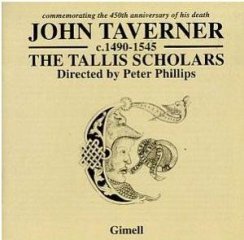John Taverner - Vocal Works (1984-1993)
John Taverner - Vocal Works (1984-1993)

1. Song: Westron Wynde (solo) Western Wind Mass 2. Gloria 3. Credo 4. Sanctus & Benedictus 5. Agnus Dei I, II & III 6. Leroy Kyrie Missa Gloria Tibi Trinitas 7. Gloria 8. Credo 9. Sanctus & Benedictus 10. Agnus Dei I, II & III 11. Dum Transisset Sabbatum (responsory) The Tallis Scholars Peter Phillips – director
John Taverner (c. 1490–1545) is regarded as the most important English composer of his day. He was also an organist. Taverner was the first Organist and Master of the Choristers at Christ Church, Oxford, appointed by Thomas Cardinal Wolsey in 1526. The college had been founded in 1525 by Wolsey, and was then known as Cardinal College. Immediately before this, Taverner had been a clerk fellow at the Collegiate Church of Tattershall, Lincolnshire. In 1528 he was reprimanded for his (probably minor) involvement with Lutherans, but escaped punishment for being "but a musician". Wolsey fell from favour in 1529, and in 1530 Taverner left the college. So far as we can tell, he had no further musical appointments, nor can any of his known works be dated to after that time, so he may have ceased composition. It is often said that after leaving Oxford Taverner worked as an agent of Thomas Cromwell assisting in the Dissolution of the Monasteries, although the veracity of this is now thought to be highly questionable. He is known to have settled eventually in Boston, Lincolnshire where he was a small landowner and reasonably well-off. He was appointed an alderman of Boston in 1545, shortly before his death on 18th October 1545. He is buried under the belltower at Boston Parish Church. Most of Taverner's music is vocal, and includes masses, Magnificats and motets. The bulk of his output is thought to date from the 1520s. His best-known motet is Dum transisset sabbatum. His best known mass is based on a popular song, The Western Wynde (John Sheppard and Christopher Tye later also wrote masses based on this same song).
Taverner's Western Wynde mass is unusual for the period because the theme tune appears in each of the four parts at different times. Commonly his masses are designed so that each of the four sections (Gloria, Credo, Santus-Benedictus and Agnus) are the about same length, often achieved by putting the same number of repetitions of the thematic material in each. For example in the Western Wynde mass, the theme is repeated nine times in each section. As the sections have texts of very different lengths, he uses extended melisma in the movements with fewer words. Several of his other masses use the widespread cantus firmus technique, where a plainchant melody with long note values is placed in an interior part, often the tenor. Examples of cantus firmus masses include Corona Spinea and Gloria tibi Trinitas. Another technique of composition is seen in his mass Mater Christi, which is based upon material taken from his motet of that name, and hence known as a "derived" or "parody" mass. The mass Gloria tibi Trinitas gave origin to style of instrumental work known as an In nomine. Although the mass is in six parts, some more virtuosic sections are in reduced numbers of parts, presumably intended for soloists, a compositional technique used in several of his masses. The section at the words "in nomine..." in the Benedictus is in four parts, with the plainchant in the alto. This section of the mass became popular as an instrumental work for viol consort. Other composers came to write instrumental works modelled on this, and the name In nomine was given to works of this type. --- guardian.co.uk
Zmieniony (Niedziela, 04 Listopad 2012 12:26)








